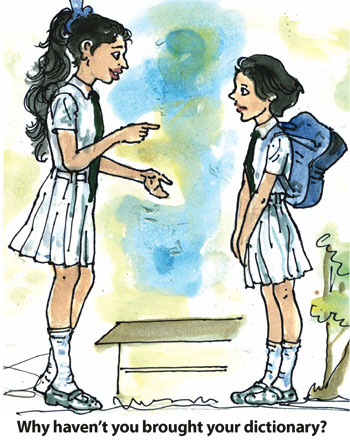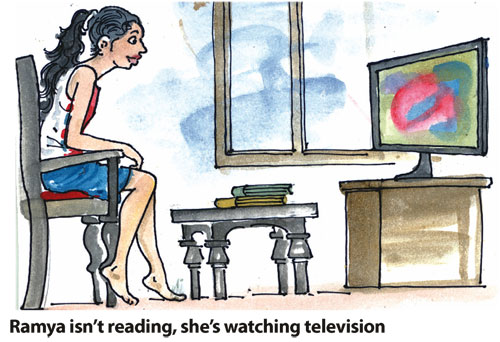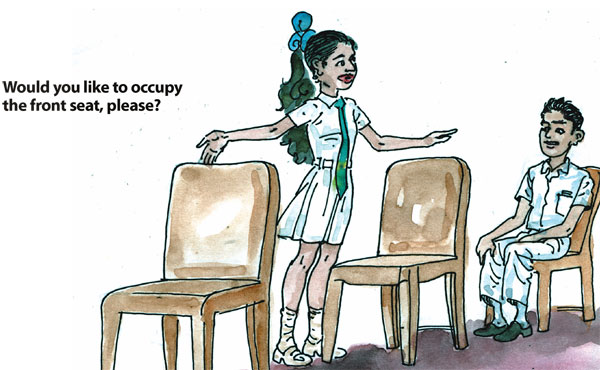|

by R. S. Karunaratne
Forming negatives with auxiliary verbs
We make negative sentences by putting ‘not’ after auxiliary or
helping verbs.

‘Be’ verbs
It is not raining.
He is not running.
She is not studying.
I am not sitting the examination this year.
We are not taking part in the literary competition.
You are not doing your exercises properly.
They are not prepared to vote for you.
Has / Have / Had
I have not learnt music.
She has not done her homework.
You have not paid your fees.
The teacher had not come when I went to school.
Bill has not come to the class today.
We have not done anything wrong.
Amanda failed the examination because she had not studied.
We use contractions in conversation.
‘Be’ verbs
Emily isn’t interested in music.
We aren’t going to the library.
You aren’t an honest person.
Ramya isn’t reading, she’s watching television.
You weren’t invited to the party.
Has / Have / Had
Mary hasn’t signed the attendance register.

We haven’t brought our notebooks.
You haven’t looked after the child properly.
He hadn’t locked the front door when he left home.
Why haven’t you brought your dictionary?
Other contractions
I can’t remember what happened.
She couldn’t apply for the post in time.
I shan’t be able to attend the meeting.
You shouldn’t be rude to strangers.
He mightn’t be successful in the examination.
You mustn’t be disappointed over the results.
Activity
Make negative sentences using contractions and check your answers
with the key.
1. These boys can play cricket.
....................................
2. Sugar is sour.
....................................
3. The children are at school.
....................................
4. Sigera has been to India twice.
....................................
5. You must give this parcel to Enid.
.....................................
6. She will be here at 8 a.m.
.....................................
7. Anne could speak English when she was four.
......................................
8. We were in Kandy last week.
.......................................
9. He is an Indian.
.......................................
10. Sam will go to Egypt next week.
.......................................
************
Key:
1. These boys can’t play cricket.
2. Sugar isn’t sour.
3. The children aren’t at school.
4. Sigera hasn’t been to India twice.
5. You mustn’t give this parcel to Enid.
6. She won’t be here at 8 a.m.
7. Anne couldn’t speak English when she was four.
8. We weren’t in Kandy last week.
9. He isn’t an Indian.
10. Sam won’t go to Egypt next week.
************
Match words and meanings
Here’s an exciting way to enrich your vocabulary. Match the words in
Column ‘A’ with their meanings in Column ‘B’ and check your answers with
the key. The first has been done for you.
[Column A]
N 1. cheat
... 2. cheeky
... 3. cheer
... 4. cheerful
... 5. cheerio
... 6. cheerless
... 7. cheers
... 8. cheery
... 9. cheetah
... 10. chef
... 11. chemist
... 12. cherubic
... 13. chic
... 14. chicanery
... 15. chickenfeed
... 16. chide
... 17. childish
... 18. childless
... 19. chill
... 20. chilling
... 21. chilly
... 22. chime
... 23. chink
... 24. chiropodist
... 25. chirpy
[Column B]
A. clever, dishonest talk
B. stylish and fashionable
C. having round, attractive face
D. a scientist who works with chemicals
E. a skilled cook
F. a wild animal of the cat family
G. bright and happy
H. thank you
I. not bright or pleasant
J. goodbye
K. happy and positive
L. a loud shout of approval
M. slightly rude
N. one who behaves in a dishonest way
O. happy and active
P. one who treats diseases of the feet
Q. a small narrow crack
R. a ringing sound
S. cold
T. frightening
U. to become cold
V. without children
W. typical of a child
X. to speak to somebody severely
Y. a small amount of money
****************
Key:
2.M 3. L 4. K 5. J 6. I 7. H 8. G 9. F 10. E 11. D 12. C 13. B 14. A
15. Y 16. X 17. W 18. V 19. U 20. T 21. S 22. R 23. Q 24. P 25. O
****************
Starters:
Polite requests and the imperative
We use ‘can’ or ‘could’ in a request when we ask somebody to do
something.
Can you be quiet for a minute, please?

Can you keep me informed?
Could you lend me Rs 500 until tomorrow?
I wonder if you could explain this to me?
Could you close the gate, please?
Note: ‘Could’ is more polite than ‘can.’
In a polite request we can also use the expressions ‘Do you mind...?’
or ‘Would you mind ...?’ with a verb in the ‘ing’ form.
Do you mind waiting for me at the gate, please?
Do you mind moving a bit, please?
Do you mind leaving your shoes at the entrance, please?
Would you mind copying this essay for me, please?
Would you mind signing these documents, please?
Would you mind sitting in the back, please?
We also use ‘Would you like ...’ to make polite requests.
Would you like to lay the table for me?
Would you like to come with me to the Sunday fair?
Would you like to spend the weekend with us?
Would you like to visit the zoo?
Would you like to occupy the front seat, please?
Note: We do not use ‘Do you like to ...’ to make a polite request.
The imperative
We use the imperative form to tell somebody what to do. This is
somewhat different from making a polite request.
Bring another plate.
Open the front door.
Hurry up, we're late for the show.
Wait here till your mother comes.
Divide the cake into 10 portions.
We use ‘don't’ in the negative form.
Don't get late.
Don't make so much noise.
Don't hit him.
Don't block the corridor.
Don't borrow anything from anybody.
Even those in authority avoid using the imperative to give orders.
They usually use ‘I want...’, ‘I'd like you to ...’, ‘You must ...’ or
any other polite request.
I want you to collect my tax returns.
I'd like you to check the figures once again.
You must take some interest in your work.
You must wait till the pedestrians cross the road.
Could you lie down on the bed, please?
Asking for things
We can use ‘Can I have ...?’ or ‘Could I have ...?’ when we ask
somebody to give something.
Can I have a glass of water?
Could I have the key, please?
Can I open your cupboard?
Could you wait here until you come back?
Could I have a receipt, please?
Could we have our room key, please?
When you ask for something in a shop, remember to use ‘please.’
Two large cotton shirts, please.
I'd like a loaf of bread, please.
I'll have a cup of tea, please.
Quiz on idioms
An idiom is a special kind of phrase. It is a group of words which
have a different meaning when used together from the one it would have
if the meaning of each word were taken individually. Tick the meaning
you think is correct for the following idioms in bold type and check
your answers with the key.
1. If you beat your chest or breast ...
(a) you publicly show regret or anger about something that has gone
wrong
(b) you reveal the truth
(c) you punish yourself
2. If you speak without missing a beat ...
(a) you speak without making a mistake
(b) you continue to speak without pausing
(c) you speak counting the number of mistakes
3. If you are an eager beaver ...
(a) you are very enthusiastic about your work
(b) you are not interested in your work
(c) you disturb others in their work
4. If you are at somebody's beck and call ...
(a) you are at the receiving end of criticism
(b) you are not ready to carry out his orders
(c) you are always ready to carry out his orders
5. If you get into bed with another ...
(a) you agree to work together with him
(b) you disagree with your partner
(c) you make secret plans
6. If you get out of bed on the wrong side ...
(a) you are in a very happy mood
(b) you are in a very bad mood
(c) you are in a confused state
7. If you put something to bed ...
(a) you do it repeatedly
(b) you postpone to do something
(c) you complete the task successfully
8. If you have made your bed, you will have to lie on it ...
(a) you have to accept the unpleasant consequences of a decision you
made earlier
(b) if you buy a bed you have to sleep on it
(c) you have no choice
9. If you have a bee on your bonnet ...
(a) you do not know what to do
(b) you feel very strongly about it
(c) you feel very sad about it
10. If you make a beeline for something ...
(a) you go straight to it without any hesitation
(b) you avoid doing something
(c) you want to achieve it
***************
Key:
1. (a) 2. (b) 3. (a) 4. (c) 5. (a) 6. (b) 7. (c) 8. (a) 9. (b) 10.
(a)
*************** |

